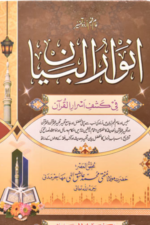ChatGPT said:
Maulana Muhammad Ashiq Ilahi Bulandshahri
Maulana Muhammad Ashiq Ilahi Bulandshahri (1925–2002) was a distinguished Indian Islamic scholar, prolific author, and educator, renowned for his extensive contributions to Islamic literature and education.
Background and Journey
Born in 1925 in Bulandshahr, Uttar Pradesh, India, Maulana Ashiq Ilahi pursued his early education at Madrasa Imdadiyya in Moradabad and Jami Masjid in Aligarh. He furthered his studies at Mazahir Uloom in Saharanpur, graduating in 1363 AH. A devoted disciple of the esteemed scholar Zakariyya Kandhlawi, he was also an authorized Sufi disciple (murid) of Talha Kandhlawi.
After completing his education, Maulana Ashiq Ilahi taught at various madrasas across India, including institutions in Ferozepur Jhirka, Muradabad, and Calcutta. In 1964 (1384 AH), at the invitation of Mufti Muhammad Shafi, he relocated to Pakistan to teach at Darul Uloom Karachi, where he served for 12 years, teaching tafsir and hadith, and overseeing the Darul Ifta department. In 1976 (1396 AH), he moved to Medina, Saudi Arabia, where he dedicated the remainder of his life to scholarship and teaching until his passing in 2002 (1422 AH). He was laid to rest in the revered al-Baqi’ cemetery.
Notable Works
Maulana Ashiq Ilahi authored numerous influential works in Urdu and Arabic, many of which have been translated into English, serving as essential resources for students and scholars worldwide. Some of his most notable works include:
-
Anwar-ul-Bayan: A comprehensive five-volume Urdu tafsir (Quranic commentary), later translated into English as Illuminating Discourses on the Noble Quran.
-
Zaadut Talibin (Provisions for the Seekers): A concise guide on Islamic jurisprudence and spirituality, translated into English by Abdur Rahman ibn Yusuf Mangera.
-
Al-Fawa’id al-Saniyya fi Sharh al-Arba’in al-Nawawiyya: An insightful commentary on Imam Nawawi’s Forty Hadiths.
-
At-Tashil ad-Daruri fi Masa’il al-Quduri: A simplified explanation of the Hanafi fiqh manual Mukhtasar al-Quduri.
-
Tohfa-e-Khawateen: A guide addressing the rights and responsibilities of Muslim women.
-
Marne Ke Baad Kya Hoga? (What Happens After Death?): A treatise exploring Islamic perspectives on life after death.
-
Huququl Walidayn: A discourse on the rights and duties towards parents in Islam.
-
Islami Adab: A work focusing on Islamic manners and etiquette.
His writings are characterized by clarity, depth, and accessibility, making complex Islamic concepts understandable to a broad audience.
Core Teachings and Influence
Maulana Ashiq Ilahi’s teachings emphasized the importance of:
-
Authentic Scholarship: Grounding Islamic knowledge in the Quran and Sunnah, as interpreted by classical scholars.
-
Spiritual Development: Encouraging personal piety and adherence to Islamic ethics.
-
Educational Outreach: Making Islamic education accessible to diverse communities, including women and youth.
His works continue to be studied in madrasas and Islamic institutions globally, reflecting his lasting impact on Islamic education and scholarship.
Legacy and Recognition
Maulana Ashiq Ilahi’s legacy endures through his extensive literary contributions and the countless students he mentored throughout his teaching career. His commitment to disseminating Islamic knowledge has left an indelible mark on the Muslim world, particularly in South Asia and among Urdu-speaking communities.
Related Topics & Genres
-
Islamic Jurisprudence (Fiqh)
-
Quranic Exegesis (Tafsir)
-
Hadith Studies
-
Sufism and Spirituality
-
Islamic Ethics and Morality

